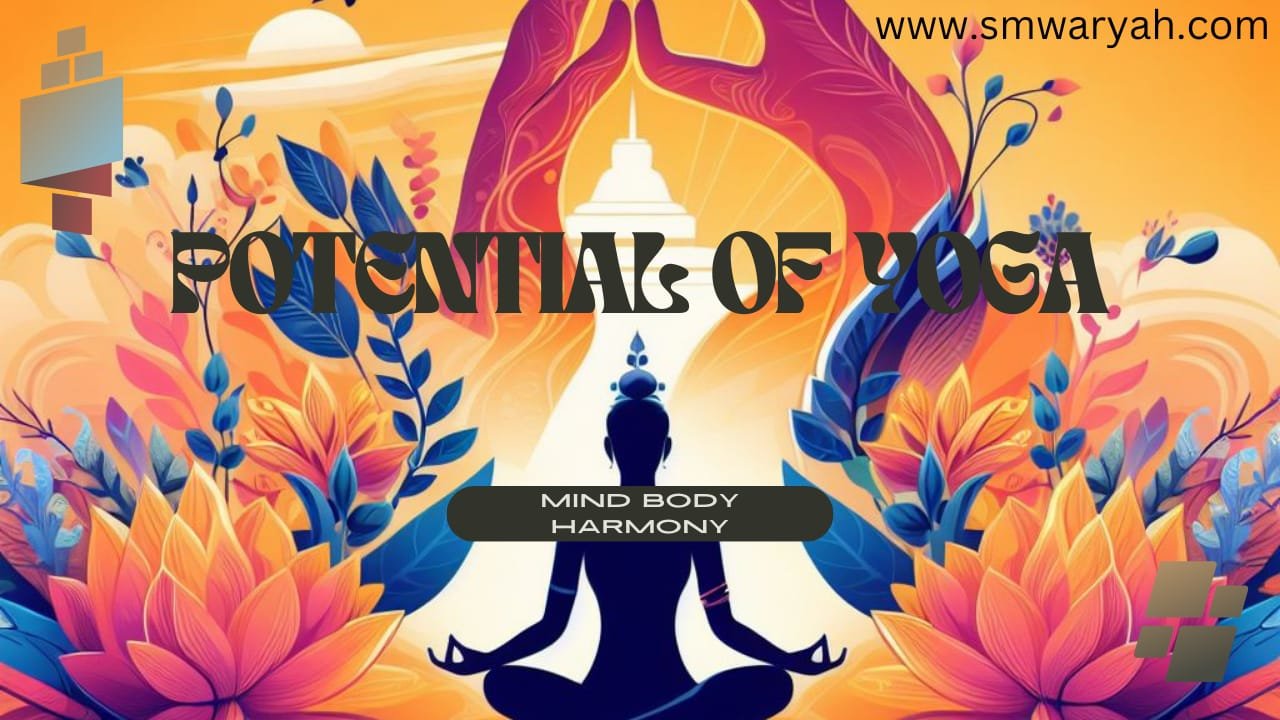In the pursuit of holistic well-being, yoga emerges not merely as a physical discipline but as a profound gateway to forge an unbreakable connection between the mind and body. Beyond its celebrated physical postures and controlled breaths, yoga unveils an intriguing dimension known as “Mental yoga.” This exploration delves into the concept of mental yoga and the transformative power it holds in cultivating mental flexibility while deepening the mind-body connection.

Embracing Yoga as a Holistic Journey :
Yoga, rooted in ancient traditions from India, has transcended its reputation as a tool for physical fitness. While its array of poses undeniably promotes physical health, it transcends mere exercise. At its heart, yoga is an intricate system that seeks unity – a unity of mind, body, and spirit. This unity, often termed the mind-body connection, forms the foundation of yoga’s immense potential. Yoga encourages practitioners not only to strengthen their bodies but also to enrich their minds, nurturing self-awareness, mindfulness, and mental discipline in tandem with physical prowess.
The Essence of Mental Yoga: Nurturing Mental Flexibility
Mental flexibility is the ability to adapt, think creatively, and gracefully navigate life’s twists and turns. Within yoga’s realm, mental flexibility extends beyond physical postures into the domain of mental and emotional adaptability. Here’s how yoga serves as a crucible for cultivating mental flexibility:
Mindfulness Meditation: Yoga entwines with mindfulness meditation, a practice that teaches individuals to observe their thoughts non-judgmentally, fostering heightened self-awareness. This self-awareness is the cornerstone of mental flexibility, as it empowers individuals to identify and transform limiting beliefs and thought patterns.
Breath Mastery: Breath, the bridge between mind and body, assumes a paramount role in yoga. Through pranayama, or controlled breathing exercises, individuals learn to regulate their breath, influencing their mental state profoundly. Consciously managed breath can calm the mind, alleviate stress, and bolster mental clarity.
Yogic Philosophy: Beyond physical postures lies a rich tapestry of yogic philosophy that delves into the nature of the mind and consciousness. Delving into this philosophy equips individuals with profound insights into their minds and the fabric of reality, nurturing mental flexibility and adaptability.
Challenging Asanas: Certain yoga poses, like inversions and balances, demand intense focus and mental concentration. The practice of such challenging asanas fortifies mental strength, concentration, and the ability to remain composed under pressure.
Emotional Catharsis: Yoga offers a conduit for emotional release. As individuals engage in physical postures and connect with their breath, they may unveil and release buried emotions and tensions. This process often leads to heightened emotional resilience and greater mental flexibility.

The Harmonious Mind-Body Symphony in Yoga :
The mind-body connection forms Yoga’s bedrock, urging individuals to acknowledge and nurture the intricate rapport between their physical and mental states. Here’s how yoga fortifies this connection:
Sensory Awareness: Yoga encourages heightened awareness of physical sensations within the body. This newfound awareness empowers individuals to identify areas of tension or discomfort while exploring the emotional and mental undercurrents that influence these sensations.
Breath and Emotion: The breath serves as a powerful conduit between mind and body. Through specific breathing techniques, yoga empowers individuals to soothe the nervous system, mitigate stress, and modulate emotions. Mastery of the breath translates to enhanced emotional control.
Release of Physical Tension:
Many yoga postures are thoughtfully designed to release physical tension and promote relaxation in specific bodily regions. As physical tension dissipates, individuals often experience a parallel release of mental and emotional tension, forging a profound mind-body connection.
Mindful Movement: Executing yoga postures with mindfulness entails dedicating full attention to every movement, alignment, and bodily sensation. This mindful engagement cultivates a profound connection between the physical body and the mind, fostering mental clarity and presence.
Emotional Fortitude: Through yoga, individuals cultivate emotional resilience by learning to confront and process emotions instead of evading or suppressing them. This capacity to engage with and transmute emotions strengthens the mind-body connection.

Tangible Strategies to Nurture Mental Flexibility and the Mind-Body Connection in Yoga :
Having explored the facets of mental flexibility and the mind-body connection within yoga, let’s embark on the practical journey of integrating these principles into your practice:
Commence with Mindfulness: Initiate each yoga session with a brief period of mindfulness meditation. Focus your attention on your breath and observe any arising thoughts or sensations without judgment.
Consciously Breathe: Devote keen attention to your breath throughout your practice. Employ deliberate, controlled breathing to anchor your awareness in the present moment and soothe your mind.
Embrace Challenge: Incorporate demanding yoga postures into your practice to augment mental fortitude and concentration. Begin with poses that challenge your limits but remain within the boundaries of your skill level.
Immerse in Yogic Philosophy:
Delve into the philosophical teachings of yoga to gain profound insights into the mind and consciousness. Consider reading books or enrolling in courses dedicated to yoga philosophy.
Invite Emotional Expression:
Grant yourself permission to encounter and release emotions that may surface during your practice. Recognize that experiencing a range of emotions is natural, and yoga provides a safe arena for exploration and catharsis.
Cultivate Consistency: Regularity is the key to harvesting the mental rewards of yoga. Strive to establish a consistent practice routine, whether it unfolds daily, weekly, or aligns with your unique schedule.
Seek Expert Guidance: Ponder the benefits of attending classes or collaborating with a certified yoga instructor. Their expertise can offer invaluable guidance and support as you navigate the journey of mental flexibility and the mind-body connection.
In Conclusion :
Yoga unveils its full potential when it transcends the realm of physical fitness and emerges as a potent catalyst for nurturing mental flexibility and harmonizing the mind-body connection. By embracing mindfulness, breath control, challenging asanas, and an exploration of yogic philosophy, individuals can unlock the transformative capacity of yoga to elevate their mental well-being. As you embark on your yoga odyssey, remember that it is a personal, ongoing voyage of self-discovery and growth, ultimately leading to an unbreakable synergy between your mind and body.

